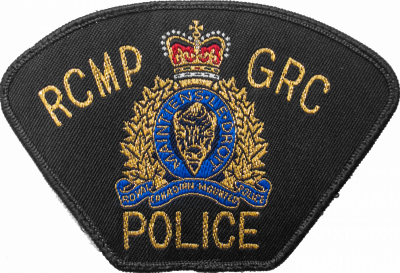The Winnipeg general strike of 1919 was one of the most famous and influential strikes in Canadian history. For six weeks, May 15 to June 26, more than 30,000 strikers brought economic activity to a standstill in Winnipeg, Manitoba, which at the time was Canada's third largest city. In the short term, the strike ended in arrests, bloodshed, and defeat, but in the long run it contributed to the development of a stronger labour movement and the tradition of social democratic politics in Canada.
The Royal Canadian Mounted Police (RCMP; French: Gendarmerie royale du Canada; GRC), often known as the Mounties, are the federal and national police service of Canada, providing law enforcement at the federal level. The RCMP also provide provincial policing in eight of Canada's provinces (all except Ontario and Quebec) and local policing on a contract basis in the three territories (Northwest Territories, Nunavut, and Yukon) and more than 150 municipalities, 600 Indigenous communities, and three international airports. The RCMP do not provide active provincial or municipal policing in Ontario or Quebec. However, all members of the RCMP have jurisdiction as a peace officer in all provinces and territories of Canada. Despite the name, the Royal Canadian Mounted Police are no longer an actual mounted police service, with horses only being used at ceremonial events.
As Canada's national police service, the RCMP are primarily responsible for enforcing federal laws throughout Canada, whereas general law and order including the enforcement of the Criminal Code and applicable provincial legislation is constitutionally the responsibility of the provinces and territories. Larger cities may form their own municipal police departments.
The two most populous provinces, Ontario and Quebec, maintain provincial forces: the Ontario Provincial Police and the Sûreté du Québec. The other eight provinces contract policing responsibilities to the RCMP, which provides front-line policing in those provinces under the direction of the provincial governments. When Newfoundland joined the confederation in 1949, the RCMP entered the province and absorbed the Newfoundland Ranger Force, which patrolled most of Newfoundland's rural areas. The Royal Newfoundland Constabulary patrols urban areas of the province. In the territories, the RCMP is the sole territorial police force. Many municipalities throughout Canada contract to the RCMP. Thus, the RCMP polices at the federal, provincial, and municipal level. In some areas of Canada, it is the only police force.
The RCMP is responsible for much of Canada security and policing. Under their federal mandate, the RCMP police throughout Canada, including Ontario and Quebec (albeit on smaller scales there). Federal operations include: enforcing federal laws including commercial crime, counterfeiting, drug trafficking, border integrity (excluding border control responsibilities exercised by the Canada Border Services Agency), organized crime, and other related matters; providing counter-terrorism and domestic security; providing protection services for the Canadian monarch, governor general, prime minister, their families and residences, and other ministers of the Crown, visiting dignitaries, and diplomatic missions; and participating in various international policing efforts.
Under provincial and municipal contracts the RCMP provides front-line policing in all areas outside of Ontario and Quebec that do not have an established local police force. There are detachments located in small villages in the far north, remote First Nations reserves, and rural towns, but also larger cities such as Surrey, British Columbia (population 580,360). There, support units investigate for their own detachments as well as smaller municipal police forces. Investigations include major crimes, homicides, forensic identification, collision forensics, police dogs, emergency response teams, explosives disposal, and undercover operations. Under its National Police Services branch the RCMP supports all police forces in Canada via the Canadian Police Information Centre, Criminal Intelligence Service Canada, Forensic Science and Identification Services, Canadian Firearms Program, and the Canadian Police College.

1919Jun, 21
The Royal Canadian Mounted Police fire a volley into a crowd of unemployed war veterans, killing two, during the Winnipeg general strike.
Choose Another Date
Events on 1919
- 5Jan
Nazi Party
The German Workers' Party, which would become the Nazi Party, is founded. - 23Mar
Italian Fascism
In Milan, Italy, Benito Mussolini founds his Fascist political movement. - 4May
Treaty of Versailles
May Fourth Movement: Student demonstrations take place in Tiananmen Square in Beijing, China, protesting the Treaty of Versailles, which transferred Chinese territory to Japan. - 19May
Turkish War of Independence
Mustafa Kemal Atatürk lands at Samsun on the Anatolian Black Sea coast, initiating what is later termed the Turkish War of Independence. - 29May
General relativity
Albert Einstein's theory of general relativity is tested (later confirmed) by Arthur Eddington and Andrew Claude de la Cherois Crommelin.

 English
English  español
español  français
français  português
português  русский
русский  العربية
العربية  简体中文
简体中文 